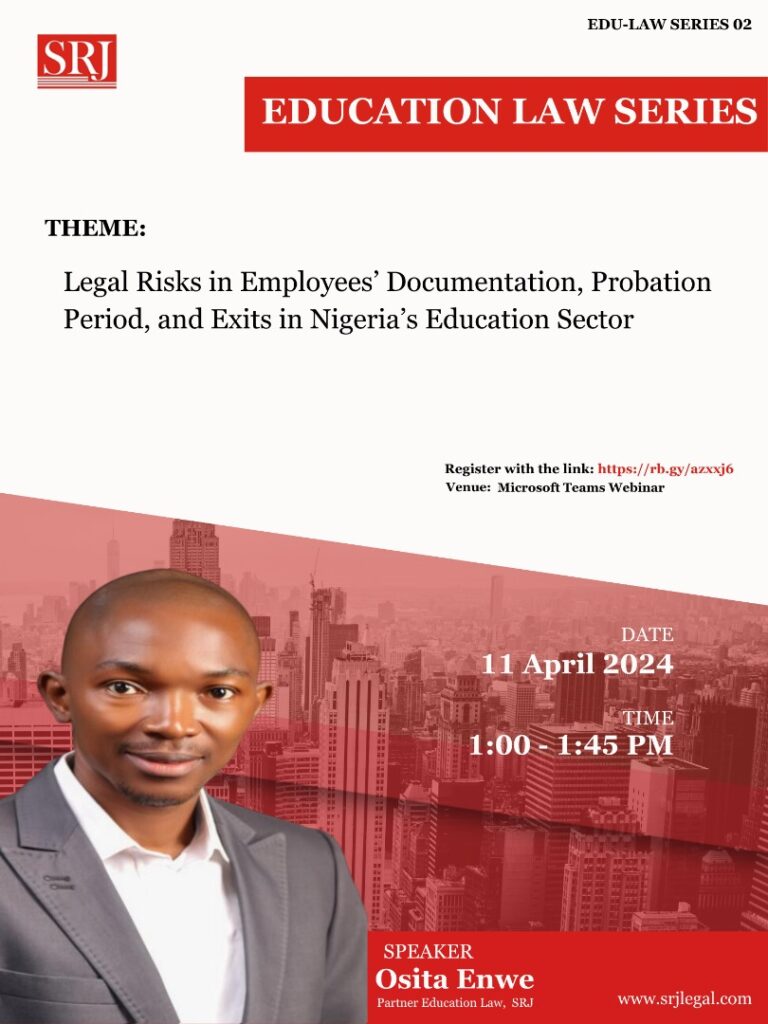SRJ is thrilled to invite you to the 2nd edition of our Education Law Series, themed “Legal Risks in Employees’ Documentation, Probation Period, and Exits Compensation in Nigeria’s Education Sector.”
Key Outcomes:
- Basics of employment contracts and insights on how the Court compensates employees under unclear contract terms.
- Probation periods, managing extension, and when the Court must consider an employee under probation as a confirmed staff member.
- Constructive dismissal, termination, and dismissal, and other practices.
Background
In Bliss International Schools, a veteran teacher, Ade, collapsed in his classroom after dedicating 23 years to teaching.
Despite his long tenure, Bliss Schools lacked transparency in its financial dealings, deducting 4.5% of Ade’s salary without evidence of pension, PAYE, or ECF contributions.
Furthermore, Bliss school failed to provide group life or medical insurance, leaving Ade vulnerable when he suffered a partial arterial blockage (stroke) in class.
Complicating matters, the school lacked a clear medical emergency evacuation policy, leaving Ade without immediate assistance and unable to use his right upper and lower limbs.
Bliss International Schools’ negligence extended to its employment policies. Like others, Ade worked without a documented employment contract or leave policy.
He often worked during academic calendar holidays, marking students’ papers and updating class materials. Adding to the confusion, Ade’s monthly salaries varied, although they were processed through Remita, a payment platform.
Considering Ade’s ordeal, Omowunmi Occupational Hazard Initiatives demanded NGN200 million in compensation from Bliss Schools, threatening legal action for punitive or exemplary damages.
Although Nigeria’s Labour Act, an outdated 53-year-old legislation, requires an employer to document employment terms within three months of employment, there is poor compliance in Nigeria’s education sector.
The Labour Officers of Nigeria’s Federal Ministry of Labour and Employment, resident in every state in Nigeria, lack funding and critical infrastructure to ensure compliance.
Poor employee rights awareness compounds the labour officer’s statutory watchdog role. Our member commented on the rights of the Labour Officer under the Labour Act here.
Admittedly, the National Industrial Court of Nigeria competently enforces the International Labour Organization’s Conventions and employment best practices.
Yet, high transaction costs, barriers to access to justice and poor employee rights awareness discourage teachers of all cadres, education administrators, students, and parents from enforcing their rights.
In a situation similar to the one experienced by the employee at Bliss International Schools, Nneoma faced challenges during her tenure.
Despite completing her mandatory NYSC at the school, she encountered delays in receiving promised allowances and lacked clarity regarding her probationary period.
Nneoma celebrated her 14-month work anniversary on LinkedIn. Bliss International Schools claims it is DEI (diversity, equity & inclusive) and gives allowances to permanent staff who are about to marry.
The probation period is four months from the employment date or the corresponding period following NYSC discharge, subject to scoring not less than 65% in appraisal.
However, her enthusiasm was dampened by Bliss International Schools’ failure to honour promised allowances and administer performance appraisals.
Although she emailed HR about her eligibility for an allowance, the appraisal process was never administered, and Nneoma was left unpaid.
Frustrated by the school’s disregard for her rights, Nneoma’s brother-in-law, an employee rights activist, demanded the allowance payment based on legal precedent, particularly since Nneoma had relocated to Canada.
In a situation mirroring the challenges at Bliss Schools, Prime School faced its employee crisis.
Following a fatal multi-vehicle accident involving the school’s vice-principal (academic), an English teacher, and several students, the English teacher remained hospitalized for months.
Despite the accident’s severity, Prime School stopped the teacher’s salary after three months, assuming the employment had been terminated due to the teacher’s incapacitation.
However, the teacher’s wife insisted that the accident occurred during employment, demanding financial support for medical expenses and continued salary payments into the teacher’s designated account.
Amidst these challenges, there is a growing awareness of employees’ rights in Nigeria’s education sector.
Join our education lawyers on 11th April 2024 at 1 p.m. for the Education Law Series #02 for an insightful discussion of the theme. It is a re-registered Virtual Event. REGISTER HERE
SRJ is an education law, retail, fintech, and commercial dispute law firm. Through employment best practices, our Education Lawyers accompany schools, parents-associations, students, regulators, education investors, education non-profits, and other interest groups.

